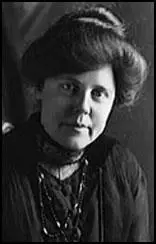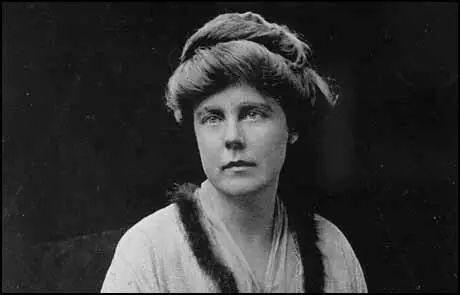Lucy Burns

Lucy Burns was born in Brooklyn, New York City, on 28th July, 1879. An Irish Catholic, Burns studied at Vassar and Yale Graduation School before teaching English at Erasmus High School.
In 1906 Burns moved to Germany to study languages. This included spells at the University of Berlin (1906-1908) and the University of Bonn (1908) before continuing her studies at Oxford University.
While in England, Burns joined the Women's Social and Political Union (WSPU) and her activities resulted in her being arrested and imprisoned. She met Alice Paul, another American working with the WSPU and when they returned home the United States they formed the Congressional Union for Women Suffrage (CUWS).
Burns and Paul attempted to introduce the militant methods used by the Women's Social and Political Union in Britain. This included organizing huge demonstrations and the daily picketing of the White House. Over the next couple of years the police arrested nearly 500 women for loitering and 168 were jailed for "obstructing traffic". Paul was sentenced to seven months imprisonment but after going on hunger strike she was released.

After the United States joined the First World War in 1917, Burns was continually assaulted by patriotic male bystanders, while picketing outside the White House. Arrested several times, she spent more time prison than any other American suffragist. Doris Stevens claimed that Lucy Barnes became the most important figure in the militant campaign: "It fell to Lucy Burns, vice-chairman of the organization, to be the leader of the new protest. Miss Burns is in appearance the very symbol of woman in revolt. Her abundant and glorious red hair burns and is not consumed - a flaming torch.... Musical, appealing, persuading - she could move the most resistant person. Her talent as an orator is of the kind that makes for instant intimacy with her audience. Her emotional quality is so powerful that her intellectual capacity, which is quite as great, is not always at once perceived."
Burns retired from political life after women in the United States got the vote. She was reported as saying: “I don’t want to do anything more. I think we have done all this for women, and we have sacrificed everything we possessed for them, and now let them fight for it now. I am not going to fight anymore.”
Lucy Burns died Brooklyn, New York City, on 22nd December, 1966.
Primary Sources
(1) Doris Stevens, Jailed for Freedom (1920)
Finding that a suffrage committee in the House and a report in the Senate had not silenced our banners, the administration cast about for another plan by which to stop the picketing. This time they turned desperately to longer terms of imprisonment. They were, indeed, hard pressed when they could choose such a cruel and stupid course.
Our answer to this policy was more women on the picket line on the outside, and a protest on the inside of prison. We decided, in the face of extended imprisonment, to demand to be treated as political prisoners. We felt that, as a matter of principle, this was the dignified and self-respecting thing to do, since we had offended politically, not criminally. We believed further that a determined, organized effort to make clear to a wider public the political nature of the offense would intensify the administration's embarrassment and so accelerate their final surrender.
It fell to Lucy Burns, vice-chairman of the organization, to be the leader of the new protest. Miss Burns is in appearance the very symbol of woman in revolt. Her abundant and glorious red hair burns and is not consumed - a flaming torch. Her body is strong and vital. It is said that Lucy Stone had the "voice" of the pioneers. Lucy Burns without doubt possessed the "voice" of the modern suffrage movement. Musical, appealing, persuading - she could move the most resistant person. Her talent as an orator is of the kind that makes for instant intimacy with her audience. Her emotional quality is so powerful that her intellectual capacity, which is quite as great, is not always at once perceived.
She had no sooner begun to organize her comrades for protest than the officials sensed a "plot" and removed her at once to solitary confinement. But they were too late. Taking the leader only hastened the rebellion. A forlorn piece of paper was discovered on which was written their initial demand. It was then passed from prisoner to prisoner through holes in the wall surrounding leaden pipes, until a finished document had been perfected and signed by all the prisoners.
(2) Mary White Ovington, letter to Lucy Burns of the National Woman's Party (17th December, 1920)
I am writing to you as an advisory member of the National Woman's Party asking if you will arrange that at the meeting, February fifteenth, a colored woman be invited to speak. I would suggest as the speaker, Mrs. Mary B. Talbert, until last June president of the Federation of Colored Women, and this summer one of the ten official members of the International Council of Women which met at Christiana. Mrs. Talbert is able, liberal in thought, and perhaps the best known colored woman in the United States today.
There was little voting and much terrorizing of Negroes in the South during the past elections and at Ocoee, Florida, there was a massacre. But equally sinister was the refusing to register women at such a place as Hampton, Virginia, where Hampton Institute has through many years endeavored to maintain kindly feelings between the two races, and yet where colored women were so insulted when they attempted to register that one woman said: "I could kill the clerk who questioned me; I could kill his wife and children."
If the South means to awaken a spirit like this it will eventually have war to face. But I believe that the Negro woman can win her right to vote if she is upheld by the rest of the country. The thinking southern woman is generally more fairminded than the southern man, but she cannot secure justice for the colored woman without she has the backing of all of us.
Will you not therefore, endeavor to have a committee appointed out of your great meeting in February which shall investigate and take some action regarding the status of the colored woman? The Woman's Party must have in its membership, South as well as North, women of broad enough vision and deep enough purpose to attack this problem. And if the women attack it, it will be solved.

